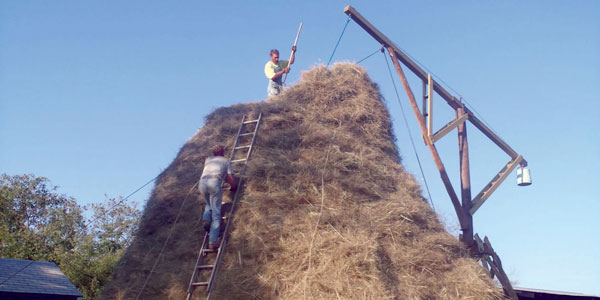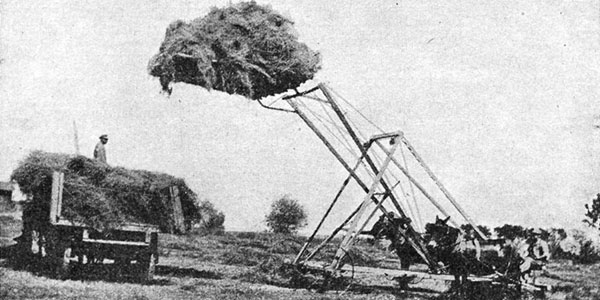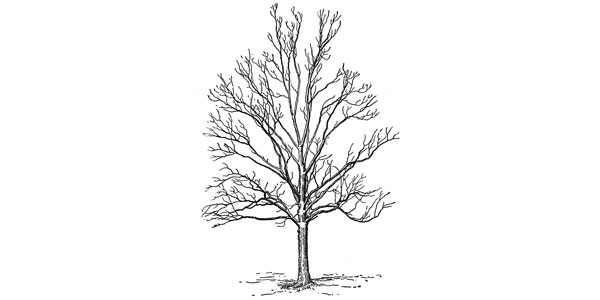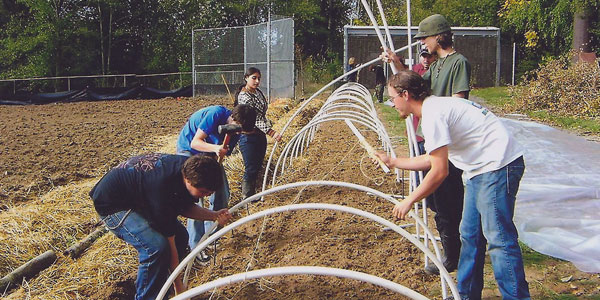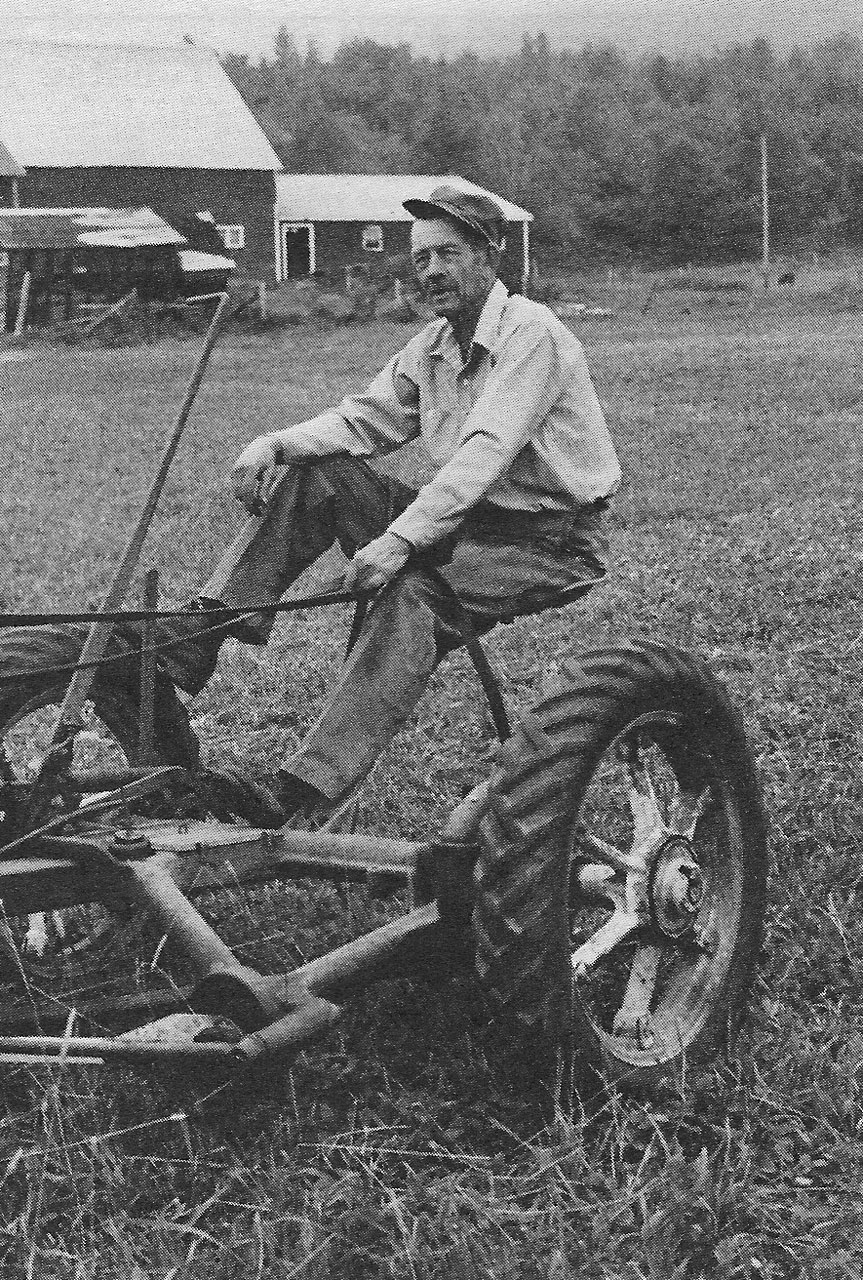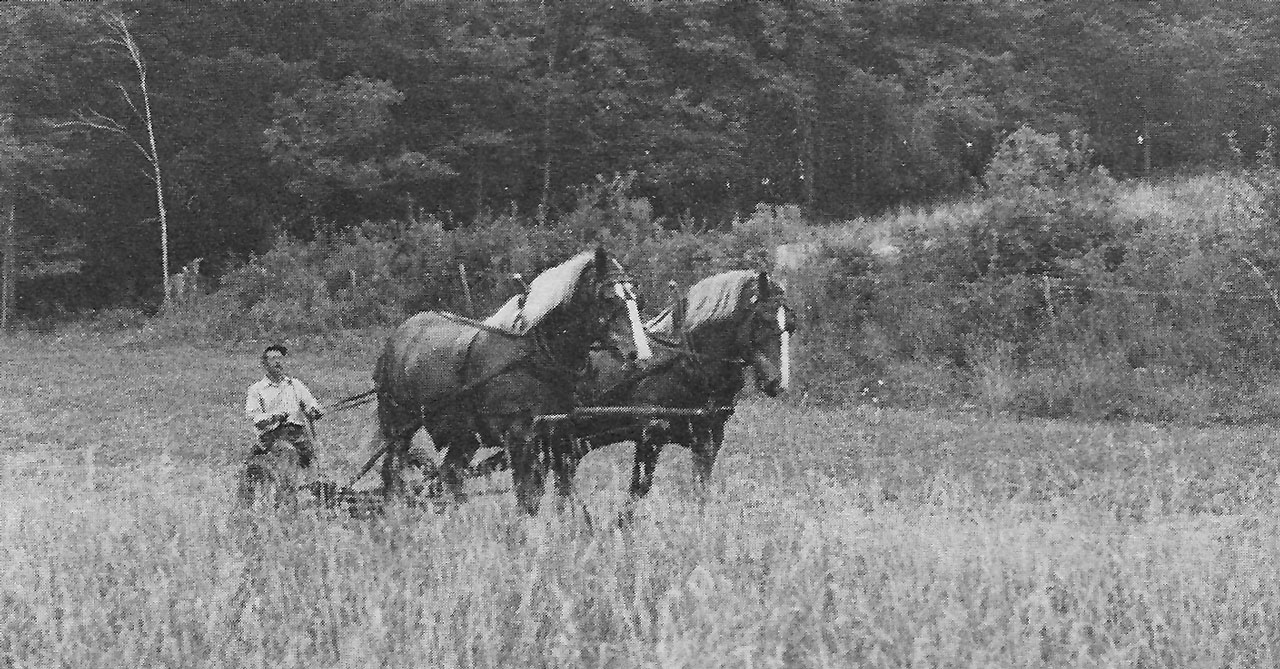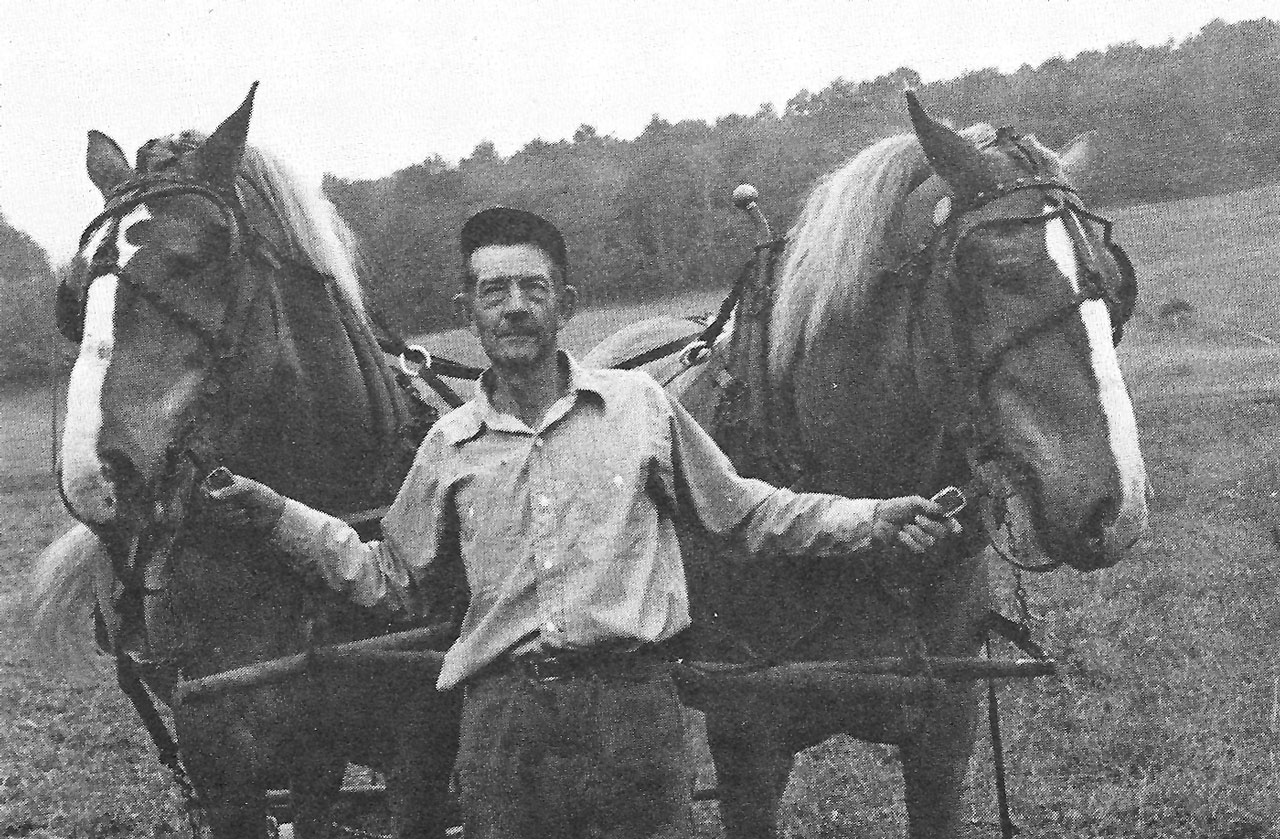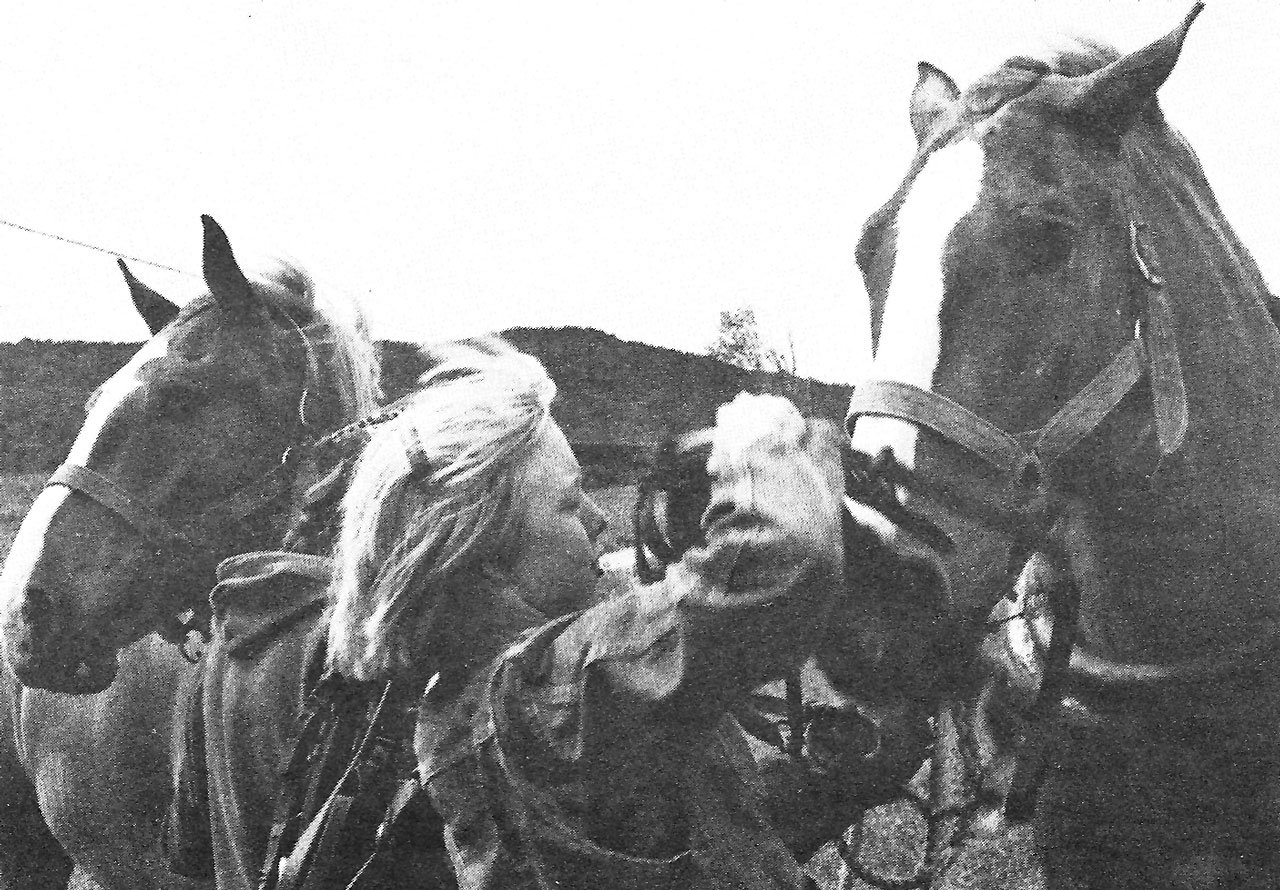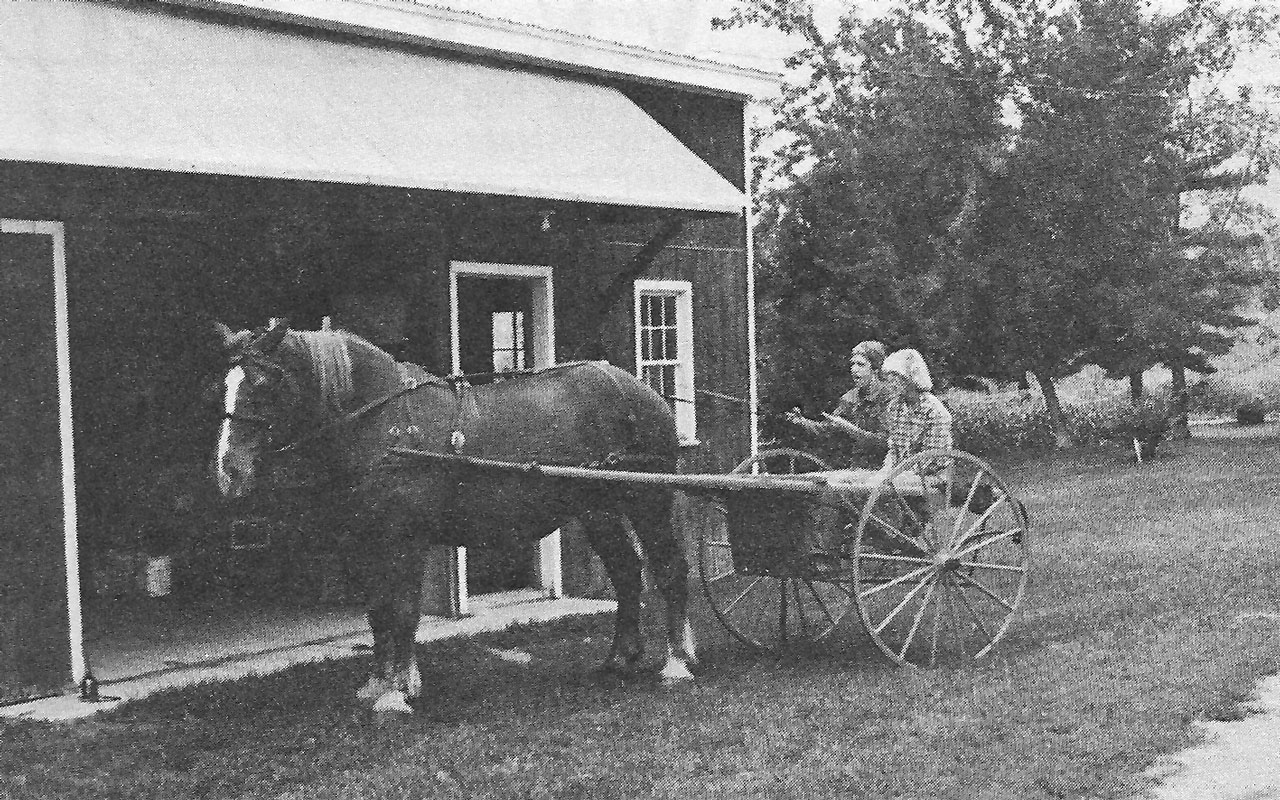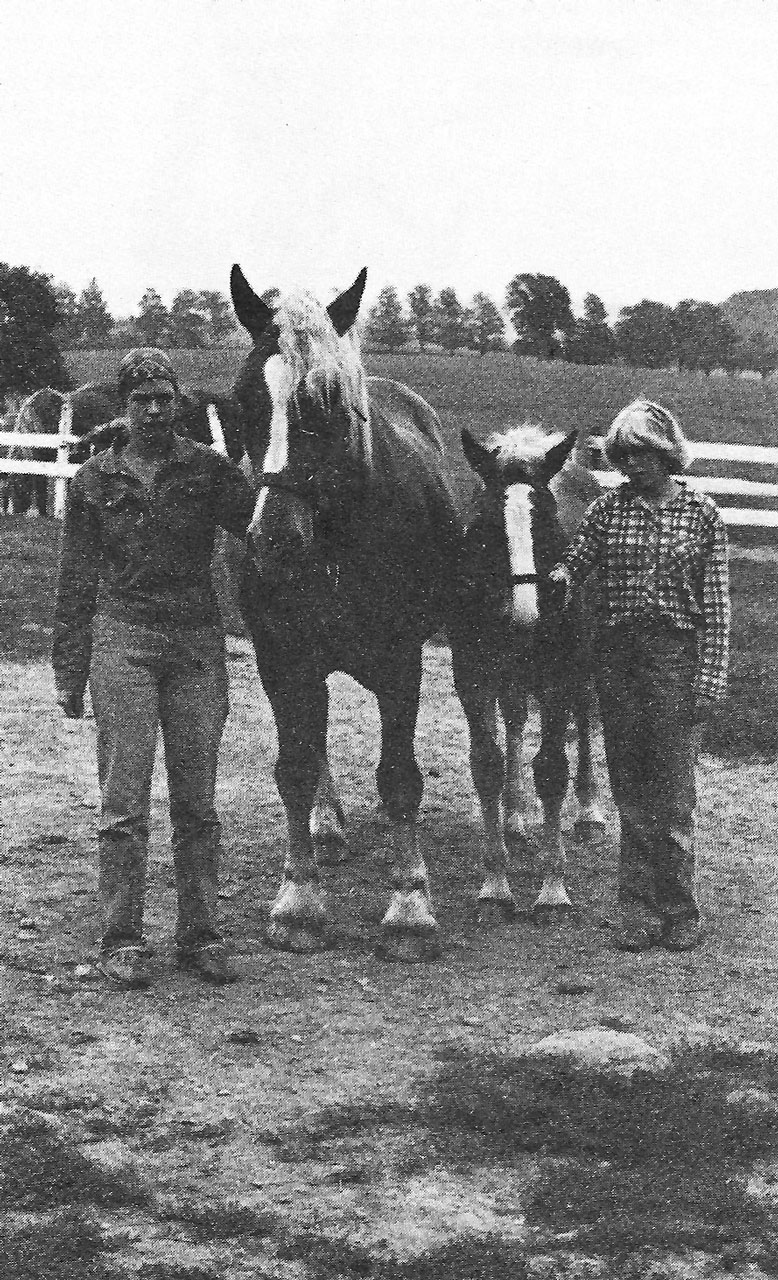
New York Horsefarmer: Ed Button and his Belgians
New York Horsefarmer: Ed Button and his Belgians
by Kathleen E. Suits Smith
In New York State one does not explore the world of draft horses long before the name of Ed Button, RD 1, Cherry Valley, is invariably and most respectfully mentioned. Ed’s name can be heard in the conversations of nearly everyone concerned with heavy horses from the most experienced teamsters to the most novice horse hobbyists. In the span of his 63 years, Ed has done virtually everything for, and with draft horses and has done it all well. His career with Belgians includes a vast catalog of activities: showing, pulling, training, farming, breeding, and driving, which Ed says, “I’ve been doing since I was old enough to hold the lines.”
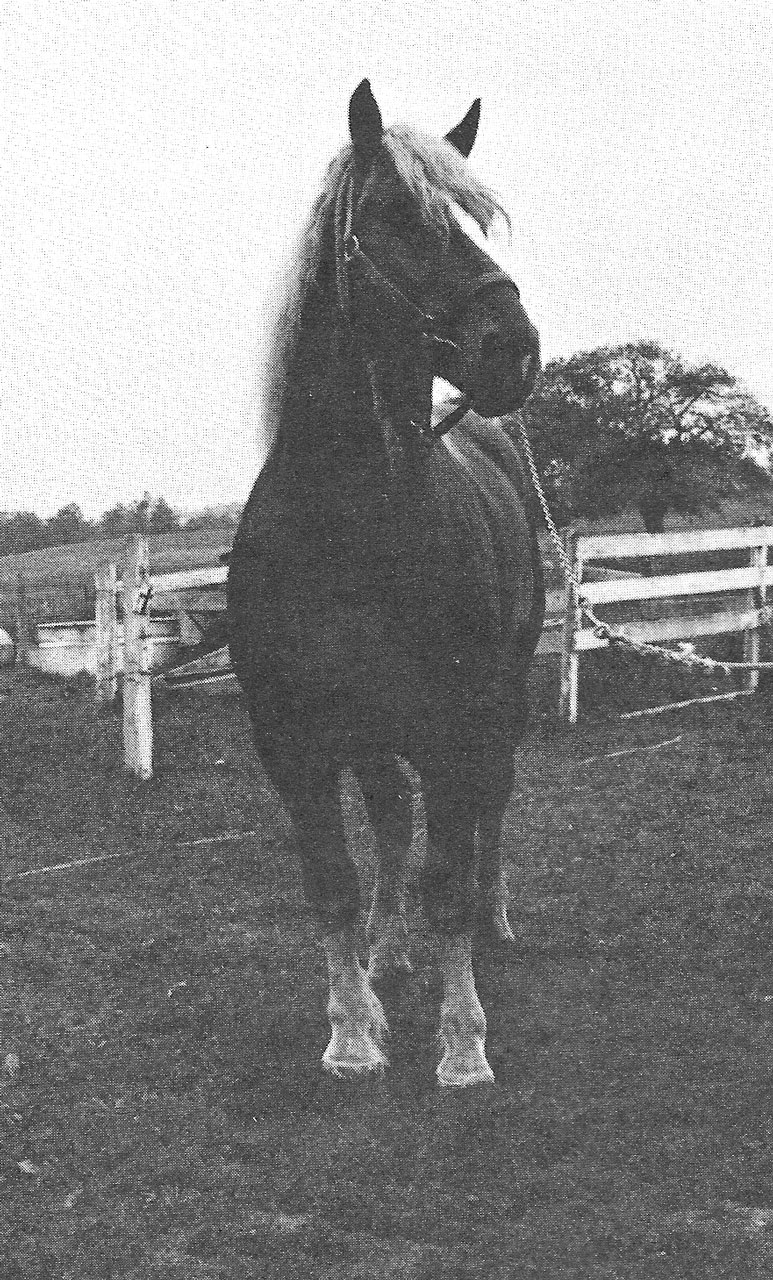
B. B. Conelrad 2nd’s Sodbuster, 33418, stands stately and impressively as naturally befits a herd sire.
One of the fondest memories from Ed’s childhood is of the driving that he used to do with his mother when he was quite young. “We had a farm horse; Prince, we called him. We used him as a road horse and a work horse. And every Saturday I can remember my mother’d let me drive when we’d take Prince and go to my grandparents’ and stay overnight. Prince wasn’t much of a horse on the way, but Sunday on the way back, he was quite a horse to hold. ‘Course my mother wasn’t far away, but I was little and that’s always just stuck in my head.” Ed goes on to describe his first real work with horses: “When I got to be five or six years old I could hitch ’em and do stuff by myself. Later, when I got older I used to drive my grandfather’s horses, and the horses on our farm.”
As an adult Ed, and his wife Helen, farmed next to his father for 30 years, where they raised a family of five daughters, all of whom were taught to handle horses. The Buttons had tractors on their farm, but they were never without horses. “I couldn’t have forgotten them when tractors came. There was too much love in my heart for horses and I couldn’t have been without a team”, confesses Ed. So, he continued to raise, train and work Belgians and Percherons. He recalls, “In the ’40’s and ’50’s anybody who kept horses, people thought was a little crazy, but I kept my horses. For awhile it was pretty hard to sell the foals; loggers were about the only ones to buy them. Up until the ’50’s and even into the ’60’s all of our work was done with horses. There were only a few years when we were without doing everything with the horses. But in the ’60’s we had trouble finding experienced teamsters around that we could trust with the horses. Before that we could always find some drivers who could handle the teams.”

King and Barney are presently Ed’s favorite team. A matched pair of full brothers, aged 4 and 5, these geldings have done a lot of work for their owner. At the time of the interview the work to be done was trimming pastures and the team faithfully cooperated.
About eleven years ago Ed and Helen moved to their present farm which is a bit smaller and allows them to turn their full attention to raising registered Belgians, and to return to horse-farming. Now Ed mows, rakes, plows, discs, drags, plants, and on special days, parades with his horses. He also finds time to participate in the various events sponsored by the NYS Draft Horse Club, and the Eastern Regional Draft Horse Club, and to occasionally sponsor something himself.
At their present farm Ed has hosted seminars for people who wish to come and learn about hitching and working horses. These seminars were held in 1978 and 1979, and were sponsored by the NYS Draft Club. Lectures and workshops were held on topics like worming, trimming feet, shoeing and hitching.
Ed also gets together with other teamsters to help fill silos, cut oats, or whatever seems to need doing at the time. One of the most recent events that Ed organized himself was the cutting of fifteen acres of oats with a reaper and binder. The oats were owned by Harold Hayes of Cherry Valley, who gratefully accepted Ed’s offer to do the work. For the cutting Ed used a four-horse hitch comprised of young, inexperienced horses. Ed’s own geldings, King and Barney, were at the wheel and Ray Putman of Rural Grove, NY, supplied the lead team, Dick and Dan. Though the event was not really publicized, word spread quickly among horse enthusiasts and spectators arrived in plenty of time to watch the hitching and cutting. Ed’s propensity for understatement and his easy-going manner reigned over the cutting. “We’re gonna’ have to make some adjustments as we go along. We’re gonna start out with four lines just ’til we get goin’. We’ve got four young horses that’s never experienced this.” Then after a long pause Ed continued, “and we’re liable to get goin’ like hell.”
When all of the hitching and adjusting was completed Ray Putman went by his lead team to get them started right, and Ed jokingly told the spectators, “Everybody look the other way now.” Then Ed spoke to the horses and they were off safely cutting oats.
Ed’s calm, easy-going disposition and his low-key attitude show on his farm as well as when he’s working horses in public. There are no fancy trimmings at the Button farm, only top quality harness, equipment, and horses. In fact, having good equipment and harness, and having it all adjusted properly is a special point with Ed. He’s not the sort of person to let much upset him, but ill-fitting harness does get Ed’s goat. “I do get bothered by poor harness”, admits Ed. “We had a pair of runaways this year at the Cobleskill Fair just because of poor harness. And there was another team there with their noses almost touching. If they’d just stopped and switched things around.”

Buster, as he’s known to the Buttons, forgets for a few minutes about impressing anyone and prefers to play at the end of the lunge-line. Ed seemed to enjoy the game as much as Buster as he shouted, “Yippee” and stepped lively to keep up with the stallion. As per his training, Buster knew when the game was over and walked quietly back to the barn.
Ed maintains the same high standard about the people who work with his horses as he does about the harness that he uses. For the past several summers he has had two top-notch assistants: his own granddaughters, Cheryl and Cynthia McGraw, aged respectively seventeen and fourteen, who are the children of the Buttons’ oldest daughter. During the school year the girls live with their parents in New Jersey, but they are with their grandparents and the Belgians whenever they have the chance. Ed compliments the girls on the quality of their horse-handling with the love of an adoring grandparent, but also with the respect of an experienced horseman. Ed explains, “I like people to be quiet around my horses, and firm with them. They shouldn’t be repeatin’. Say it once and be firm.” Cheryl and Cindy seem to exemplify their grandfather’s qualifications for a horse handler, but the girls also include kindness, gentleness and love in their work with the Belgians. Their grandfather continues, “This summer when they got here, that Bunny foal was a little wild, but they tamed her down, got her leadin’ and ready to show. And they got first place foal with Bunny at the Cobleskill Fair. They’re my stablehands, my assistants, and my trainers. All I do is supply the horses.” Ed fails to mention, however, just who it was who taught the girls all they know about horses. It seems safe to assume that it was their grandfather.
Helen, Ed’s wife, stays out of the limelight of shows, parades, pictures, and gatherings, but she helps with the feeding of the horses and hates to sell a single one. Says Ed, “She gets married to them the same as I do and she’s always tellin’ me I can’t sell any. But I can’t keep them all because we need the income.”
Helen seems to have had some bad luck around the horses because she’s had various injuries over the years. Nothing has been really serious, but was it enough to make her wish that she’d married a man who liked to perhaps collect stamps, or sell insurance? “No, because I like the horses,” Helen unequivocally states, though she admits to being a bit careful working around them.
Helen’s primary interest is the cows. She keeps two Jerseys to supply them with milk and she adamantly comments, “When we moved here we weren’t going to have any cows, but I straightened that out in a hurry because I hate pasteurized milk”. Helen thus spends her time in a supportive role regarding the Belgians, but a very active role regarding the Jerseys, the garden, and their home. Though Helen maintains a low profile with the horses, her presence is felt and she knows the Belgians well.
Ed and Helen Button have ribbons, trophies and honors far too numerous to mention. They range from many grand champions and first place ribbons, to the honor of having consigned top money horses at draft sales. None of the ribbons, or the trophies, or the honors can be found very easily at the Button farm, though; unless, of course, you ask. Ed has many fine quality horses that are matched with equally fine harness and equipment; but the high quality will not be mentioned, unless, of course, you ask. Ed Button has a great deal of knowledge of every aspect of draft horsemanship, and is a skilled trainer and teamster. But, one need not ask to be shown these things; one needs only to watch Ed Button and his Belgians.
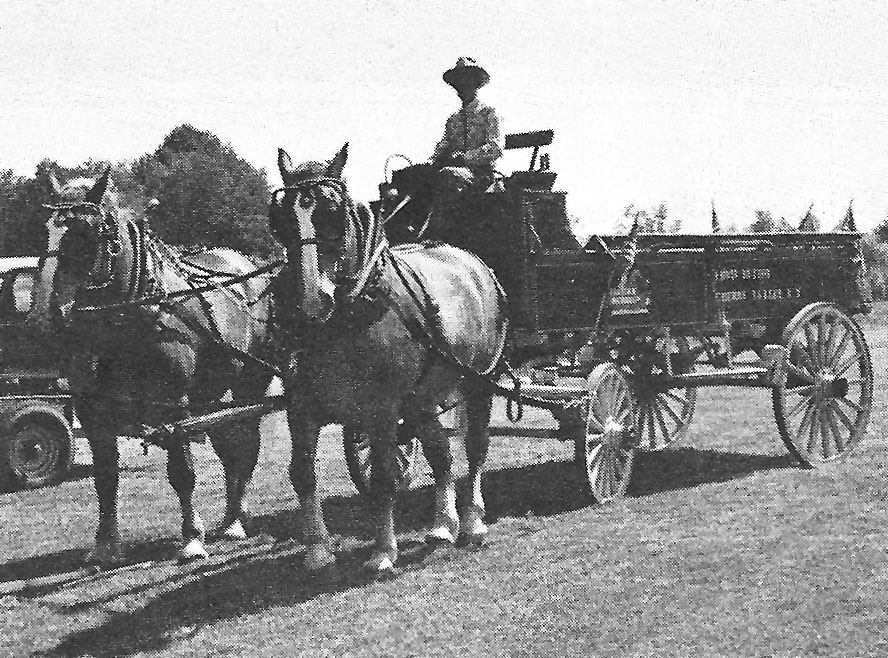
Ed Button awaits the start of the Fourth of July parade in Springfield Center, NY. This year Ed joined his young geldings, King and Barney, with a team owned by Jack Mulligan of Richfield Springs, NY to make a prize-winning four-horse hitch.
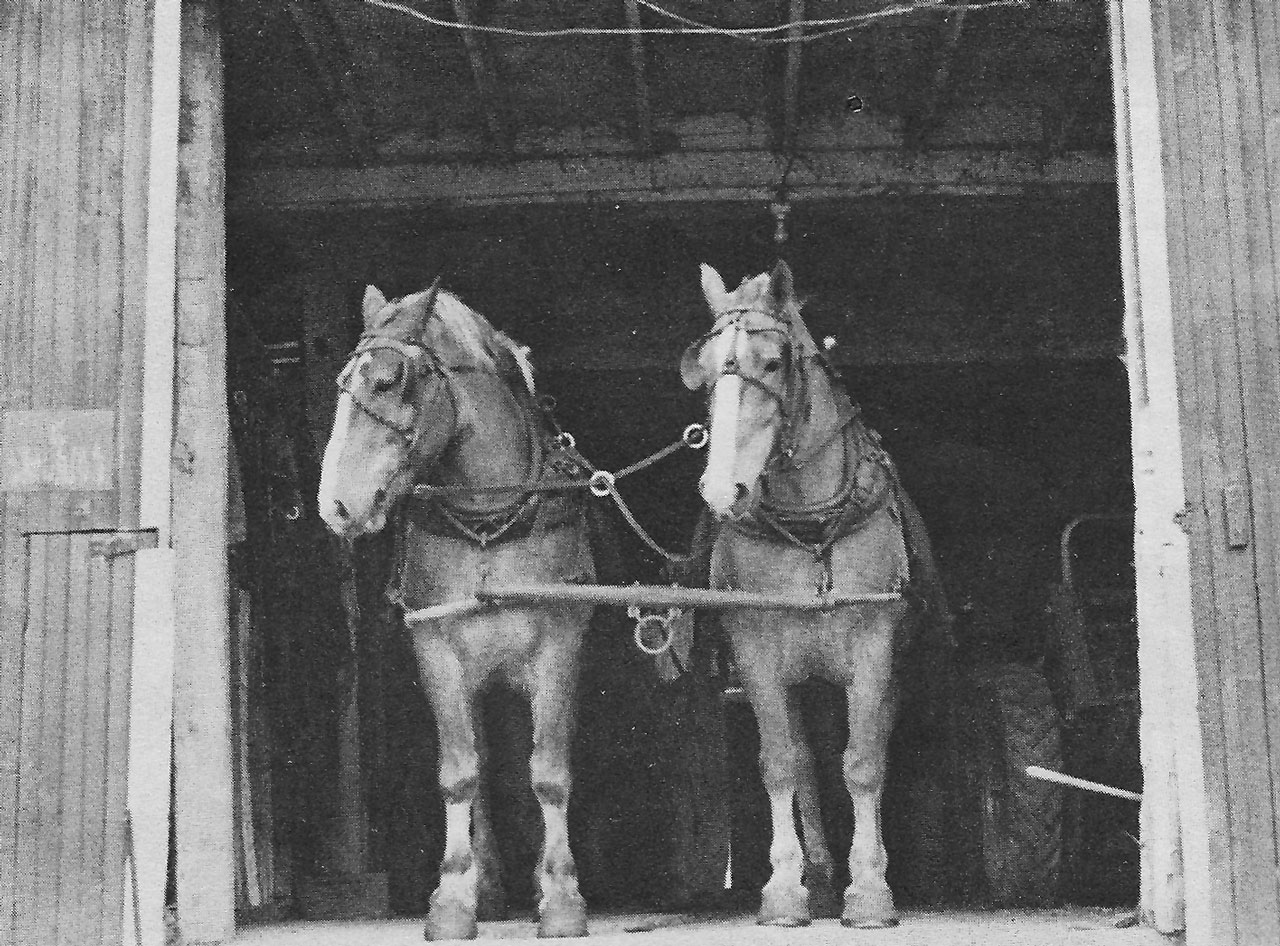
As they left the barn, Ed stopped the team for a picture, but King and Barney weren’t interested in posing. They were listening to their driver.

Somehow the wagon and the mower weren’t parked in just the best places; so it made for a close situation as the team turned around. But, as Ed said, “It’s going to be a tight squeeze, Barney. Get around.” And King and Barney did as they were told.
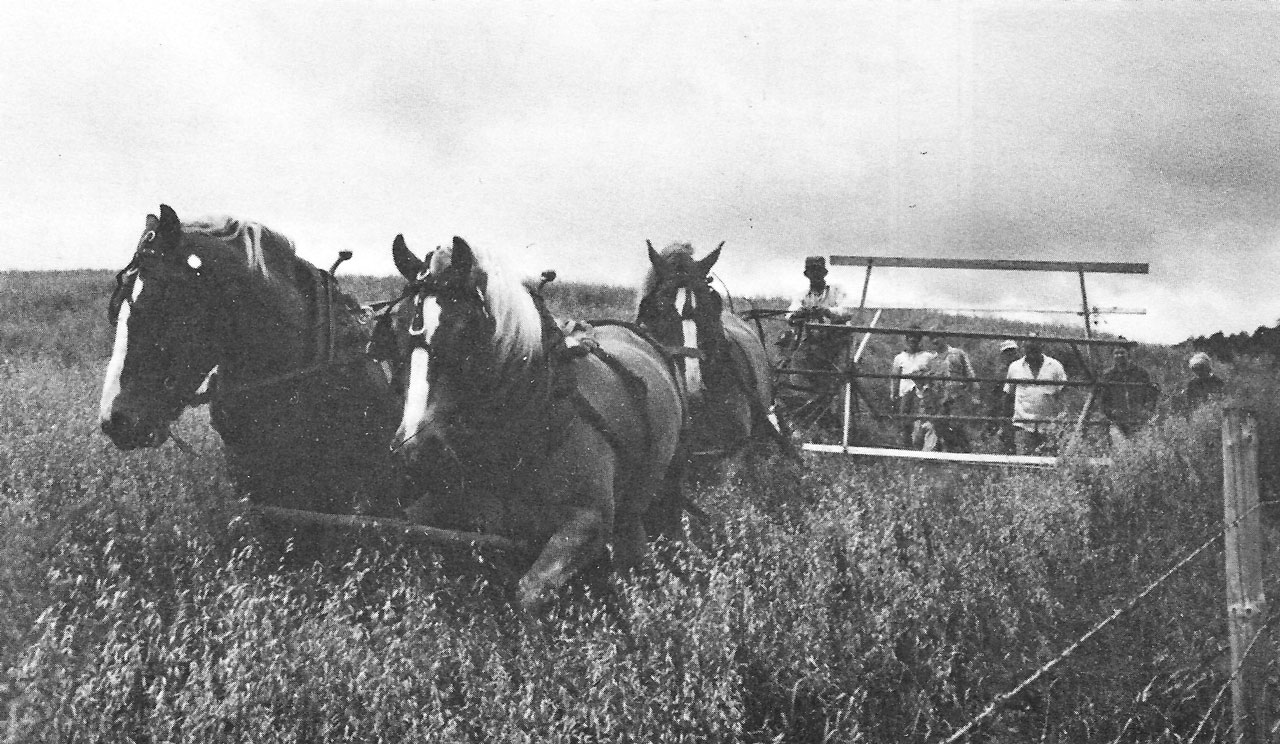
Ed and his newly made four-horse hitch cut oats before a group of ambitious friends who acted as field hands.
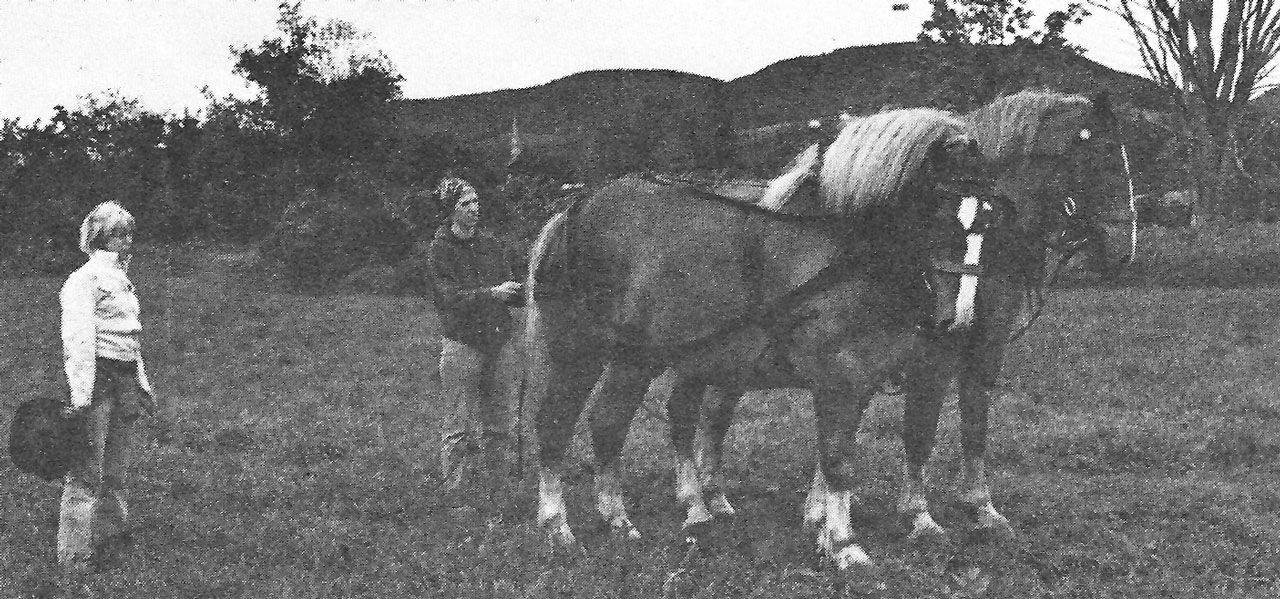
As the breezes blew and the clouds covered the sun making the cutting of oats impossible, Cheryl and Cynthia brought King and Barney back to the truck to be unharnessed.

Cheryl and Cynthia harness old Veda, who Ed says, “…is spending her retirement years entertaining the grandchildren.” At the age of 22, Veda has had a long and varied career freely doing whatever task was at hand, including training colts.

